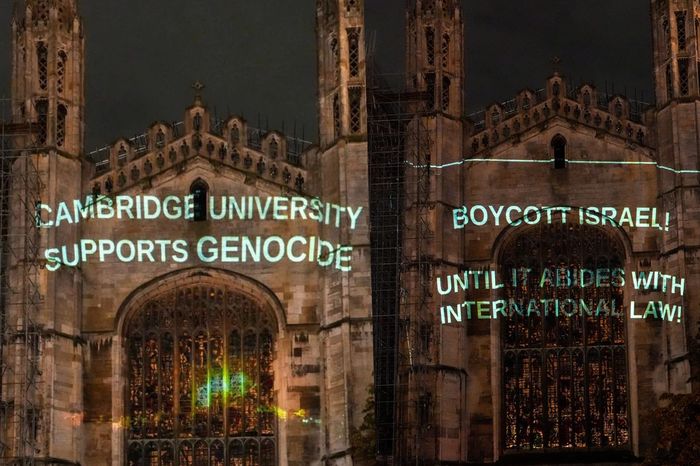Palestine Society says University ‘complicit in genocide’ after ‘failed’ Vice-Chancellor meetings
PalSoc said meetings ended with the University ‘refusing to publicly call for a ceasefire’ or ‘seriously engage’ with demands for divestment from Israel

Cambridge’s Palestine Society has said the University is “institutionally complicit in genocide”, claiming meetings with the Vice-Chancellor failed to “seriously engage” with the demands of pro-Palestinian students and staff.
A meeting between Vice-Chancellor Deborah Prentice and PalSoc representatives was held after over 1,600 students and staff signed a letter demanding the University “assess and sever financial ties with Israel” last month.
The Palestine Solidarity Society (PalSoc) said the interaction ended in the University “refusing to publicly condemn Israel’s crimes against humanity”, “call for a ceasefire”, or “engage” with the possibility of divestment.
Israel has been conducting a retaliatory airstrike, siege, and ground invasion campaign on Gaza since the October 7th attacks by Hamas, which is designated a terrorist group by the UK, killed 1,400 people.
In that time period, over 10,800 Palestinians have been killed in Gaza, including 4,400 children, and Israeli ground forces have now encircled Gaza City.
In the face of University opposition, pro-Palestinian divestment advocates have cited Cambridge’s removal of financial ties to the Russian Federation after the invasion of Ukraine as precedent for this type of decision.
In March 2022, Cambridge publicly released and largely brought to an end its connections with Russia through University endowment fund investments, research funding, donations, and academic partnerships.
But University considerations in relation to Israel are being made in a markedly different national context, particularly given parliament’s recent debate of the anti-divestment bill.
The bill will prevent public bodies from campaigning against, boycotting or sanctioning international territories, unless that is endorsed by the UK government’s own foreign policy.
Despite this, PalSoc have reiterated their demands, saying “divestment is not impossible” and that they “will not be silenced” as “the death toll in Gaza continues to mount”.
Divestment activism on campus has been gathering speed in recent days, with protesters repeating demands at a third week of large demonstrations. Meanwhile, isolated incidents of student activism have seen the words “Boycott Israel” projected onto King’s college chapel and a small group of masked protesters entering the Institute for Manufacturing, pushing for research partnerships to be cut.
According to PalSoc, meetings with Vice-Chancellor Prentice also culminated in the University refusing to “condemn Israel’s crimes against humanity” or “call for a ceasefire”.
This comes after Cambridge’s official statements on events in the Middle East have triggered disgust amongst both Israeli and Palestinian students.
Last month’s widely-signed pro-Palestinian letter demanded the University replace its official position of recognising the “loss of innocent lives in Israel” but only “impacts of escalating violence in Gaza” with an explicit “denunciation of inhumane measures imposed on Gaza by Israel”.
These calls have been left unanswered, according to PalSoc, who said the University has “refused to amend their earlier statement’s dehumanising language”.
At the Vice-Chancellor meetings, Cambridge did reportedly commit to a “zero tolerance approach to all forms of ethno-religious harassment” and “affirming everyone’s rights to hold and express their views within the law”.
 Comment / Cambridge’s tourism risks commodifying students18 April 2025
Comment / Cambridge’s tourism risks commodifying students18 April 2025 News / Cambridge student numbers fall amid nationwide decline14 April 2025
News / Cambridge student numbers fall amid nationwide decline14 April 2025 News / Greenwich House occupiers miss deadline to respond to University legal action15 April 2025
News / Greenwich House occupiers miss deadline to respond to University legal action15 April 2025 Comment / The Cambridge workload prioritises quantity over quality 16 April 2025
Comment / The Cambridge workload prioritises quantity over quality 16 April 2025 News / Varsity ChatGPT survey17 April 2025
News / Varsity ChatGPT survey17 April 2025






